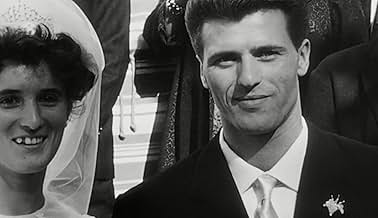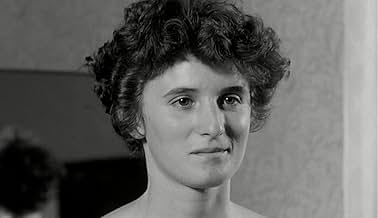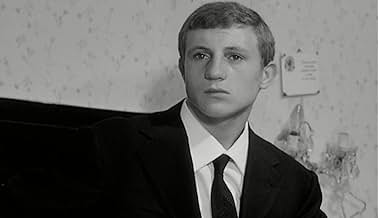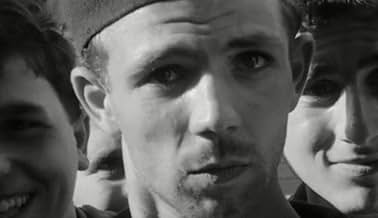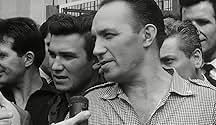IMDb रेटिंग
7.5/10
2.9 हज़ार
आपकी रेटिंग
अपनी भाषा में प्लॉट जोड़ेंDirector Pasolini traverses Italy in 1963 with camera and microphone interviewing people in public places about sex, marriage and gender roles.Director Pasolini traverses Italy in 1963 with camera and microphone interviewing people in public places about sex, marriage and gender roles.Director Pasolini traverses Italy in 1963 with camera and microphone interviewing people in public places about sex, marriage and gender roles.
Lello Bersani
- Narrator
- (वॉइस)
Io Appolloni
- Self - Girl at Lido with Swimming Cap
- (बिना क्रेडिट के)
Graziella Chiarcossi
- Graziella the Bride
- (बिना क्रेडिट के)
Graziella Granata
- Self - Girl at Lido with Long Hair
- (बिना क्रेडिट के)
Pier Paolo Pasolini
- Self - Interviewer
- (बिना क्रेडिट के)
फ़ीचर्ड समीक्षाएं
Comizi d'amore (1965)
*** (out of 4)
Pasolini travels around Italy throwing a mic into various ranges of people asking frank and honest questions about sexuality. Various topics ranging from homosexuality, prostitutes, divorce, sexual freedom and even asking kids where babies come from. The type of people range from college students to the rich and poor and to women who normally can't speak openly. I'm sure this film was more of a sensation when originally released but I think it holds up quite well today for several reasons. For one, it's interesting to look back over forty-years ago and see how young people at the times thought about sex but also how the older people back then looked back on the moral and religious rules of their youth. The film also holds up well today because things really haven't changed too much whenever you really break down the groups of people like Pasolini did. I'm not sure is there was a point to this documentary as it seems like the director simply wanted to know what the country felt on certain issues. There's a lot of humor to be found in the film but most of this comes from the answers the children give about where babies come from. The most interesting thing, knowing that the director was gay, is him asking people about homosexuality and the answers they give him. Most people reply with disgust and I kept wondering if the director would crack and say something but he never does. I think the film goes on a bit too long but it's an interesting look at sexuality on moral and religious aspects.
*** (out of 4)
Pasolini travels around Italy throwing a mic into various ranges of people asking frank and honest questions about sexuality. Various topics ranging from homosexuality, prostitutes, divorce, sexual freedom and even asking kids where babies come from. The type of people range from college students to the rich and poor and to women who normally can't speak openly. I'm sure this film was more of a sensation when originally released but I think it holds up quite well today for several reasons. For one, it's interesting to look back over forty-years ago and see how young people at the times thought about sex but also how the older people back then looked back on the moral and religious rules of their youth. The film also holds up well today because things really haven't changed too much whenever you really break down the groups of people like Pasolini did. I'm not sure is there was a point to this documentary as it seems like the director simply wanted to know what the country felt on certain issues. There's a lot of humor to be found in the film but most of this comes from the answers the children give about where babies come from. The most interesting thing, knowing that the director was gay, is him asking people about homosexuality and the answers they give him. Most people reply with disgust and I kept wondering if the director would crack and say something but he never does. I think the film goes on a bit too long but it's an interesting look at sexuality on moral and religious aspects.
Pasolini's informal interviews with Italians about sexual matters doesn't make for a perfect study or a perfect documentary, but it does provide an interesting window into the time period, and it was pretty unique as well. The people he talks to seem to provide a pretty good sample, including those from many regions in Italy and across various categories - men/women, old/young, city/rural, college educated/blue collar, and conservative/liberal. As most of his interviews are conducted in big groups and what appear to be impromptu meetings I don't think it was all that scientific, and wondered how many things were left unsaid out of social pressure. However, in the end I felt like people hadn't been shy with expressing their opinions, and a picture was painted of a changing country - the deeply conservative aspects gradually facing inevitable progress.
The questions that Pasolini seemed most concerned with were:
Is sex important? Are young girls as free as young boys? Should a woman be a virgin when she gets married? Does marriage solve the "sexual issue"? What do you think of sexual "abnormality"? (by this he means, argh, homosexuality) Should divorce be legalized in Italy? (it wasn't possible in the country until 1970)
It's a little tough to hear some of the answers, e.g. about how women are inferior and shouldn't be allowed to work or even go out to a café alone, how a woman should be killed if she commits adultery instead of divorced (to lots of jokes and smiles!), or how homosexuals are disgusting and should be "cured." It was also a little tough to hear Pasolini push so much for prostitution, asking young women workers why they don't make a lot more money by selling themselves, not thinking to interview a prostitute about the significant dangers of her profession or the emotions involved with selling one's body. Similarly, he doesn't interview someone who is gay, even with their identity concealed. His questions often reflect the patriarchy and conformity, making it a window into Pasolini in addition to the window into Italy, and I say that knowing his orientation.
I don't fault the film too much for these things because it's reflecting the society in 1964, and I'm happy times have changed. If a documentary was made about values today, I'm certain that when viewed over half a century later we, too, would collectively appear backward (hell, we appear pretty backward even today :). It was also a pleasure to hear answers which were real gems, a lot of times from young women, professing a desire for equality between the sexes, an end to the outmoded double standard, and practicality in allowing divorce. In a couple of places a clear link is formed between poverty and some of the archaic attitudes, which I found fantastic. That included one guy explaining that sexual harassment at work is a problem thusly:
Man on street: "Freedom is conquered through work. In Germany, they work from when they're 12 to old age. ... In Palermo, if a woman goes to work, her brother grabs her and says, 'Where are you off to?' 'To work.' 'You can't go. The boss will harass you.' Do you understand?" Pasolini: "And so you agree that if economic conditions changed in Palermo..." Man on street: "When employers learn how to behave with girls! Only then! When employers are polite towards women."
Pasolini then idiotically says "but the boss can't have sex with one hundred workers," which even if he's playing devil's advocate is a flawed argument in several respects and which leads to a response that goes down the rathole, that yes indeed, here in Sicily one or two women a day could be easily done. These are the kinds of things you put up with in Love Meetings.
The questions that Pasolini seemed most concerned with were:
Is sex important? Are young girls as free as young boys? Should a woman be a virgin when she gets married? Does marriage solve the "sexual issue"? What do you think of sexual "abnormality"? (by this he means, argh, homosexuality) Should divorce be legalized in Italy? (it wasn't possible in the country until 1970)
It's a little tough to hear some of the answers, e.g. about how women are inferior and shouldn't be allowed to work or even go out to a café alone, how a woman should be killed if she commits adultery instead of divorced (to lots of jokes and smiles!), or how homosexuals are disgusting and should be "cured." It was also a little tough to hear Pasolini push so much for prostitution, asking young women workers why they don't make a lot more money by selling themselves, not thinking to interview a prostitute about the significant dangers of her profession or the emotions involved with selling one's body. Similarly, he doesn't interview someone who is gay, even with their identity concealed. His questions often reflect the patriarchy and conformity, making it a window into Pasolini in addition to the window into Italy, and I say that knowing his orientation.
I don't fault the film too much for these things because it's reflecting the society in 1964, and I'm happy times have changed. If a documentary was made about values today, I'm certain that when viewed over half a century later we, too, would collectively appear backward (hell, we appear pretty backward even today :). It was also a pleasure to hear answers which were real gems, a lot of times from young women, professing a desire for equality between the sexes, an end to the outmoded double standard, and practicality in allowing divorce. In a couple of places a clear link is formed between poverty and some of the archaic attitudes, which I found fantastic. That included one guy explaining that sexual harassment at work is a problem thusly:
Man on street: "Freedom is conquered through work. In Germany, they work from when they're 12 to old age. ... In Palermo, if a woman goes to work, her brother grabs her and says, 'Where are you off to?' 'To work.' 'You can't go. The boss will harass you.' Do you understand?" Pasolini: "And so you agree that if economic conditions changed in Palermo..." Man on street: "When employers learn how to behave with girls! Only then! When employers are polite towards women."
Pasolini then idiotically says "but the boss can't have sex with one hundred workers," which even if he's playing devil's advocate is a flawed argument in several respects and which leads to a response that goes down the rathole, that yes indeed, here in Sicily one or two women a day could be easily done. These are the kinds of things you put up with in Love Meetings.
Pasolini filmed this documentary in 1963, looking for an account of sexual life in Italy at a turning point in history. He travels south and north, to towns and countryside, interviewing intellectuals, workers, farmers and kids. The result is a strikingly accurate portrait of diversities in the country, and of inhibitions and problems to talk about a "natural" thing. Between the notable people interviewed, Nobel prize poet Ungaretti, writers Moravia, Cederna, Fallaci, a whole professional football team, and more.
What stroke me more is the great journalistic pace of the documentary, the technique of intermixing different areas of the country, a very clever approach. A great work still "modern" nowadays.
Sadly amusing the part where Pasolini (an homosexual himself) asked common people an opinion about homosexuality receiving answers of total denigration.
What stroke me more is the great journalistic pace of the documentary, the technique of intermixing different areas of the country, a very clever approach. A great work still "modern" nowadays.
Sadly amusing the part where Pasolini (an homosexual himself) asked common people an opinion about homosexuality receiving answers of total denigration.
In this documentary, Pasolini travels around Italy and interviews random people in public places about their attitudes towards sexuality, marriage, and gender issues. It's fascinating to hear how Italians in the early 1960s felt about these topics, and there are plenty of opinions that seem shocking from a modern perspective. There are people who think that divorce should be illegal (they'd rather have spouses kill each other), parents who find it perfectly normal for 14 year-old boys to lose their virginity with a prostitute, and women who think it's only right that they have less rights and freedoms than men. It's especially interesting to hear the interviewees confess their unabashed disgust towards homosexuals to the secretly gay director.
However, I can't help but wonder if it wouldn't have been more interesting to include some interviews that weren't conducted in public places with groups of people standing around. As it stands, the movie gets a bit repetitive after a while and probably would have been more effective with a shorter running time.
However, I can't help but wonder if it wouldn't have been more interesting to include some interviews that weren't conducted in public places with groups of people standing around. As it stands, the movie gets a bit repetitive after a while and probably would have been more effective with a shorter running time.
Saw this beautifully preserved/restored print, with subtitles, via YouTube. Pasolini, with his reputation for political and every other form of radicalism, seems inhibited here, even in the discussion segments with Alberto Moravia and Cesare Musatti. The man-and-woman (and children, students)-in-the-street-and-on-the-farm interviews seem dated, probably since the interviews were conducted on the cusp of major changes in marital and family laws, policies, sexual attitudes in Italy and elsewhere. While no groundbreaking documentary, it's still a fascinating document of the time and place. A more daring and cinematically imaginative treatment of similar themes is found in, of course, "I am Curious (Yellow)"(1967) and "I am Curious(Blue)"(1968), directed by Vilgot Sjoman (a former UCLA film student). In those days there were things you could do in Sweden, albeit with censorship problems, that were simply impossible in Italy, period.
क्या आपको पता है
- कनेक्शनEdited into Lo schermo a tre punte (1995)
टॉप पसंद
रेटिंग देने के लिए साइन-इन करें और वैयक्तिकृत सुझावों के लिए वॉचलिस्ट करें
- How long is Love Meetings?Alexa द्वारा संचालित
विवरण
बॉक्स ऑफ़िस
- दुनिया भर में सकल
- $2,789
- चलने की अवधि
- 1 घं 32 मि(92 min)
- रंग
- ध्वनि मिश्रण
- पक्ष अनुपात
- 1.85 : 1
इस पेज में योगदान दें
किसी बदलाव का सुझाव दें या अनुपलब्ध कॉन्टेंट जोड़ें


